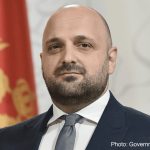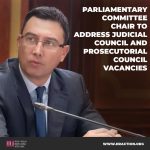28/3/2012 Request for information from the Supreme State Prosecutor (SSP) on action taken to investigate reports on maltreatment in the Maternity Ward of the Clinical Centre of Montenegro
29/03/201206/04/2012 Press release regarding the situation in the Public Institution “Komanski most”
06/04/201201/04/2012 Human Rights Action on the proposed amendments to the Constitution of Montenegro
The proposed amendments continue to provide solutions that are contrary to recommendations of the Venice Commission and do not ensure the independence of the Constitutional Court and Protector of Human Rights and Freedoms. The proposed amendments do not exclude political influence in the Judicial Council sincethe members of the Judicial Council who are not judges are not forbidden from being politically engaged. Non-governmental organizationsare not provided an opportunity to propose prominent legal experts for members of the Judicial Council to be elected in the Parliament. Legalsolution pursuant to which the Minister of Justice cannot vote in disciplinary proceedings against judges and the one forbidding court presidents to be members of the Judicial Council have been unjustifiably left out. The proposed thorough reform of the provisions on the prosecution has not been conducted either. Under the proposed solution, from the possible adoption of amendments to the Constitution pursuant to which the Parliament shallno longer decide on the appointment of prosecutors, until the amendment of the Law on the State Prosecutor’s Office which would entrust this authority to the Prosecutorial Council, no prosecutor could be appointed or dismissed (and bearing in mind the past experience in Montenegro, this loophole may not be amended for some time). Only a number ofsuchshortcomings in the proposed amendments could be overcome by urgent amendments to relevant laws, but without a comprehensive constitutional reform there shall be no appropriate preconditions for the full rule of law in Montenegro.
The following is the analysis of the solutions offeredin proposed amendments to the Constitution of Montenegro.
- OFFENCES AND SECONDARY LEGISLATION: Proposed amendments to Articles 33 and 34 of the Constitution have been improved in accordance with the suggestions of the Human Rights Action (HRA) by mutually harmonizing them and providingfor criminal offenses and sanctionsto be prescribed only by law.
-
THE CONSTITUTIONAL COURT: Independence ofjudges of the Constitutional Court has still not been provided, since it is prescribed that judges shall be electedby a majority of all parliamentarians, meaningthat they are elected exclusivelywith the will of the ruling majority. HRA proposal for the Parliamentto elect and dismiss judges of the Constitutional Court by a 2/3 majorityat the proposal of the President of Montenegro, Judicial Council and relevant parliamentary committee has not beenaccepted, although HRA pointed out that such election methodexists, for example, in Croatia and Germany, and thatpursuant to the opinion of the Venice Commission such system functions well. It should be noted that in its opinion of 14 June 2011 the Venice Commission pointed out that more attention should be paid to the reform of the Constitutional Court, especially in terms of its independence, particularly pointing out that under the current legal solution judges of the Constitutional Court are elected by simple majority.
Furthermore, HRA proposal for the Parliament to elect the judges of the Constitutional Court at the proposal of the President of Montenegro, Judicial Council and relevant parliamentary committee has not been accepted either, leavingthe solution under which only the President of the State proposes all judges. The proposed solution is contrary to the opinion of the Venice Commission, which stressed that the system in which all judges are elected at the proposal of the President solely ”does not guarantee a balanced composition of the Court” and in particular ”if the President is coming from one of the majority parties, it is therefore likely that all judges of the Court will be favourable to the majority”.
-
THE PROTECTOR OF HUMAN RIGHTS AND FREEDOMS: Same as in the case of the Constitutional Court, HRA proposal for the Parliament to appoint and dismiss the Protector of Human Rights and Freedoms by a 2/3 majority so as to provide his/her independency, i.e.the appointment of a person who will be favourable not only to the majority, has not been accepted. Therefore, our proposal to delete the words “shall appoint and dismiss the Protector of Human Rights and Freedoms” from Article 91, paragraph 2 of the Constitution, in accordance with section 56 of the Venice Commission Opinion on the Constitution of Montenegro, no. 392/2006 of 20 December 2007, has not been accepted (translation is published in the book”International Human Rights Standards and Constitutional Guarantees in Montenegro”, Human Rights Action, Podgorica, 2008, www.hraction.org).
-
DISMISSAL OFJUDGES: It is stipulated thatthejudgeshall bedismissedonly ifconvicted in a finaldecision ofa criminaloffense committedby abuse ofthe judicial function,and notalwayswhen convictedof an offense thatmakes him/her unworthyof the judicial office, as provided inthe existing solutionin paragraph3 of Article121 of the Constitution,and, for instance, in the Constitutionof the Republicof Croatia.
-
APPEAL AGAINST DISMISSAL: HRA proposal for a judge to have the right to file a constitutional appeal against the decision on dismissal, and not a claim to the Administrative Court, as it is currently provided, has not been accepted. Independent status of the judicial function within the regular court system requires an appeal to the body outside of that system – for example, how willthe Administrative Court convincinglyresolve an appeal against dismissal of a judge of the Administrative Court?!
-
INCOMPATIBILITY OF JUDICIAL FUNCTION: HRA proposal to amend the provision of Article 123 of the Constitution providing for the incompatibility of the judicial function with other functions, so that the legislator is obliged to specify by law what is considered as “professional performance of other activities” and what is not, as prescribed e.g. in the Constitution of the Republic of Serbia, has not been accepted. For example, it is common for judges to write and publish books, teach at universities and participate in professional projects, but, despite an earlier HRA recommendation, this has not yet been specified in the Law on Courts and the Law on the Judicial Council, andit is up to the will of the Judicial Council to decide in each individual case, living the judges in uncertainty.
-
APPOINTMENT OF THE PRESIDENT OF THE SUPREME COURT: The proposal for the President of the Supreme Court to be appointed and dismissed by the Judicial Council with a 2/3 majorityhas been accepted, which is consistent with the opinion of the Venice Commission and the earlier HRA proposal.
-
PRESIDENTS OF THE COURTS IN THE COMPOSITION OF THE JUDICIAL COUNCIL: With regard to the Draft, the Proposalomits the wording that four judges in the composition of the Judicial Council elected by the Conference of Judges cannot be from the ranks of thepresidents of courts. HRA finds such solution poor and reemphasizes that no president of any court, including the President of the Supreme Court, should be a member of the Judicial Council. The Judicial Council should supervise the work ofcourts and courts are managedby their presidents. It is therefore logical thatthe presidents of courtsare not members of the council that supervises their work, and this particularly applies to the President of the Supreme Court, whose position entailsthe highest degree of responsibility for the work and state in courts. It should be pointedout once again that the proposed solution disregards the risk that the authority which the court president logicallyholds among other judgesmay affect the judges who are members of the Judicial Council and to whom the court president is the superior, to accepted his standpoint uncritically.
-
MEMBERS OF THE JUDICIAL COUNCIL WHO ARE NOT JUDGES: Under the proposed amendment, as regards the members who are not judges, the Parliament should elect two distinguished legal experts at the proposal of the parliamentary majority and opposition, while two renownedlegal experts shall be elected and dismissed by the President of Montenegro. HRAfinds such solution suitable, sinceit proposes that the members elected and dismissed by the Parliamentare not parliamentariansbut distinguished legal experts, which is in line with HRA proposal and the recommendation of the Venice Commission. However, HRA proposal which has not been accepted suggested the introduction of restrictions for these members of the Judicial Council to ensure that they are not politically engaged, and are selected from the list of candidates proposed by civil associations (NGOs), based on the criteria and procedure prescribed by law (modelled after the procedures for appointment of NGOs representativesin the RTCG Council, the Council for Cooperation between the Government and NGOs, the Council for Protection against Discrimination, the Council for Civilian Control of the Police),[1] or on the basis of open competition (for example, for members appointed by the President). Thus, there are no restrictions for members of the Judicial Council who are not judges in terms of their political engagement. The Minister of Justice and Human Rights is also a member of the Judicial Council and, as a representative of the executive branch,he too compromises the Council as an impartial and independent body. By reason of all of the aforementioned, the proposed solution is incomplete and only partially contributes to the avoidance of politicization of the Judicial Council. Therefore, the law should prescribe that the Judicial Council members who are not judges were not members of any political party or actively engaged in a party, directly elected in elections or performed function as the Government member for at least several years before the appointment. The same restriction should be prescribedfor judges of the Constitutional Court.
-
THE PRESIDENT OF THE JUDICIAL COUNCIL: Under the proposed solution, the President of the Judicial Council shall be elected from among the members who are not judges, which reduces the risk of autocratic management of the judiciary, in accordance with the recommendation of the Venice Commission to thereby ensure the necessary link between the judiciary and society. However, given thatno restrictions in relation to political engagement are provided for legal experts appointed by the Parliament and President, enablingpersons who are politically actively engaged to be appointed, there is a riskforthe very President of the Judicial Council, whohas a casting vote, to be a politically engaged person and even a member of a political party. Therefore, the proposed solution does not guarantee that half of the members of the Judicial Council shall not be politically engaged, because the four members who are not judges are not subject to theserestrictions (and they are appointed by politicians), while the Minister of Justice and Human Rights is a political official and together with them makes half of the Council members. HRA believes that in order to eliminate political influence it is crucial to ensure that the Council member who is to be its President is not politically engaged, which isnot provided in the proposed amendment.
-
CONFLICT OF INTEREST: In relation to the above, it should be rememberedthat the Law on the Judicial Council does not contain any provisions on the prevention of conflicts of interest, making the political influence more plausible. This is particularly concerning in Montenegro, given the current practice where the wife of the President of the State is the member of the Judicial Council and President of its Disciplinary Committee and the fact thatit is notuncommonfor judges to be close relatives of officials of the executive and legislative branches.
-
THE MINISTER’S RIGHT TO VOTE IN THE COUNCIL: Reasons for the Proposalleaving outthe provision prescribing that the Minister shall not vote in proceedings concerning disciplinary responsibility of judgesare unclear, sincethatfurther allowsfor political influence and threatens the principle of separation of powers. Instead, the current restriction should be amended so that the Minister does not vote in the proceedings concerning dismissal of judges either.
-
APPOINTMENT OF STATE PROSECUTORS: Contrary to the Draft,the Proposal of amendments does not include all proposed changes to the provisions on the State Prosecutor’s Office, except forthe deletion of a part of the provisions under which the Parliament was authorized to appoint prosecutors and the Supreme State Prosecutor. HRApresumes that the intention is to prescribe their appointment by the Prosecutorial Council. Such situation now requires immediate legal action, because in the meantime, from the adoption of the Constitution until the amendment of the Law on the State Prosecutor’s Office, no state prosecutor can be appointed or dismissed! Reasons for not conductinga more thorough constitutional reform of the appointment of prosecutors are incomprehensible, especially bearing in mind that the Venice Commission welcomed the solution to prescribe the composition of the Prosecutorial Council and its competencies by the Constitution. The Venice Commission has recommended that the basis for dismissal of the Supreme Public Prosecutor should be prescribed by the Constitution, but this recommendation has not been accepted either.
The law should also prescribe that the Supreme State Prosecutorbe appointed by the Prosecutorial Council with a qualified (2/3) majority, ashas been proposed for the President of the Supreme Court to be elected by the Judicial Council.
The Venice Commission assessed the changes that have been previously proposed in the draft as steps ”in the right direction”which ”attempt to truly improve the existing situation” but stressed that they alone will not suffice to change the situation in the judiciary in Montenegro, and that the legislationshould be further amended to improve the processes of appointment of judges and prosecutors, the effectiveness of disciplinary proceedings against judges and prosecutors, etc.
Human Rights Action is actively participating in the public debate on constitutional changes within the project “Monitoring of the Judicial Council”, with the support from USAID under the program “Effective governance in Montenegro”implemented by the East West Management Institute.







 English
English